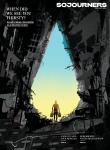WHEN THE CREDITS rolled for the live-action remake of How to Train Your Dragon, I didn’t expect to think of Catholic theologian G.K. Chesterton. But it makes perfect sense. What better time to remember the words of the “prince of paradox” than during a kid’s movie about a dragon slayer who becomes a dragon friend, all with the backdrop of Iceland’s natural beauty and composer John Powell’s engrossing musical score. The film easily summoned these words from Chesterton’s 1909 essay collection Tremendous Trifles: “The world will never starve for want of wonders; but only for want of wonder.” Beauty and wonders surround us. And if we’re willing to stop and listen, such gifts can dislodge our biases and fears.
These seemingly unexceptional heroes are in fact gifted in their capacity for awe.
The new film focuses on Vikings who live on the isle of Berk, where they fight dragons for survival and space. The socially awkward and soft-spoken Hiccup frequently clashes with his father, Stoick, the Viking leader. Hiccup eschews Berk’s traditional masculine norms; he feels more curiosity than bloodlust toward the dragons. Yet, Hiccup gets his chance to prove his worth when he seems to kill the most feared dragon, Night Fury.
Hiccup is a normal kid: He has crushes, insecurities, and familial angst. Director Dean DeBlois knew Hiccup was joining a long line of powerful but unassuming heroes. “There’s a time-honored tradition of protagonists who are just regular kids but have a transformative bond with something amazing,” Dean told Sojourners, calling to mind Luke Skywalker from Star Wars and Elliott Taylor from E.T. But these seemingly unexceptional heroes are in fact gifted in their capacity for awe.
It’s this awe that allows Hiccup to imagine a society that stops beheading dragons and starts befriending them. When Hiccup goes to inspect the slain Night Fury, he realizes that it’s alive. Staring upon the dragon’s enveloping wings and sleek black scales, Hiccup is unwilling to pierce it with his blade. DeBlois stresses the need for more people to pause before acting out of fear. “We are so quick to make war with one another,” he said. “If we have the courage, understanding, and empathy to get to actually know our perceived enemies, then there are many more logical and peaceful solutions.”
For DeBlois, wonder is a delightfully galvanizing force. As a kid, “it wasn’t jokes or action [in films] that stuck with me but the way I would be enraptured with this sense of wonder.” Stories can remind us that real heroes aren’t those who lose themselves in a lust for power, but those who allow their lives to be disrupted by a lust for wonder.

Got something to say about what you're reading? We value your feedback!

